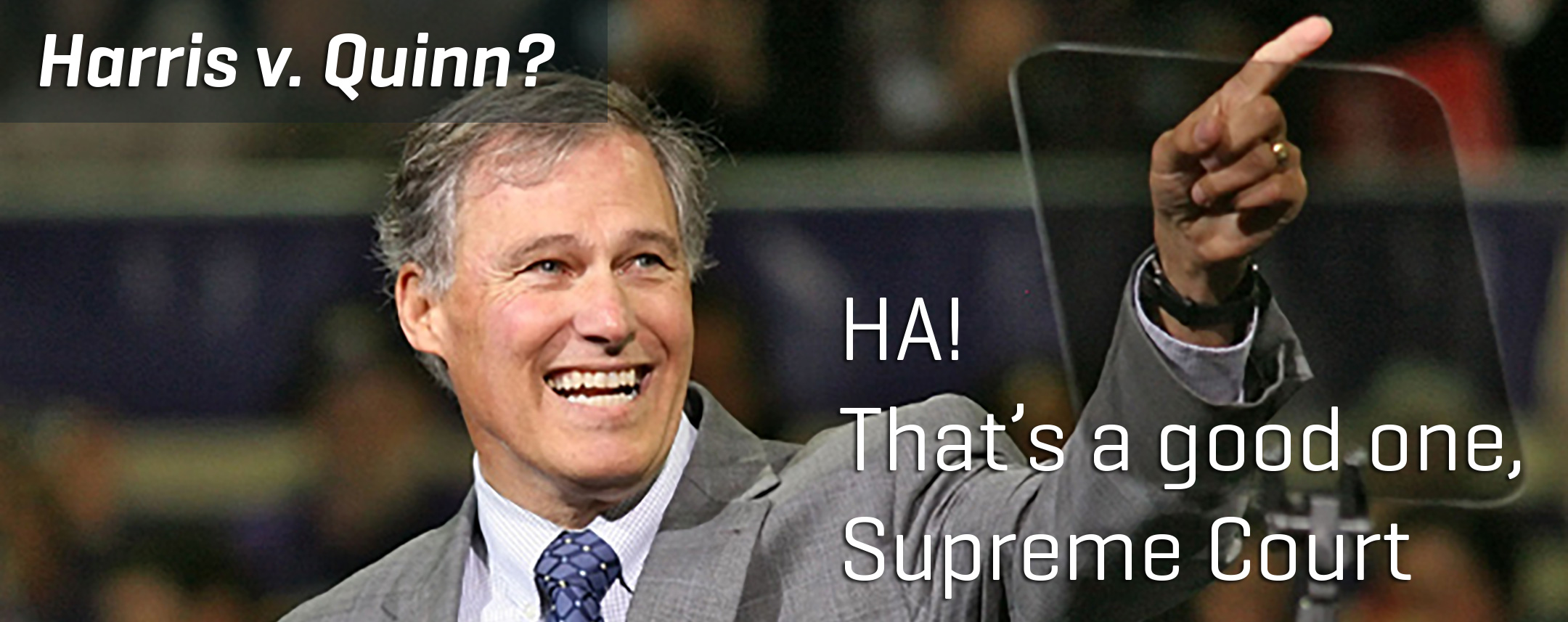Records obtained by the Freedom Foundation from Gov. Jay Inslee’s office under the state Public Records Act indicate that his administration is working with Washington labor unions affected by the U.S. Supreme Court’s recent Harris v. Quinn decision in order to maintain the unions’ ability to automatically deduct dues from certain union-represented workers.
Handed down in July, the Harris ruling established that it is unconstitutional for “partial public employees”—independent workers who receive subsidies from the state—to be required to pay union dues as a condition of employment. There are four groups of such employees in Washington—individual provider home care aides, family child care providers, language access providers and adult family home care providers.
In response to the ruling, affected unions have been scrambling to try and maintain their ability to have the state automatically deduct dues from all represented workers.
Documents from Inslee’s office indicate his administration has been communicating and coordinating extensively with organized labor before, during and in the wake of the Harris ruling.
Excerpts from the documents/emails are quoted below as written, including grammatical and typographical errors.
1. A document (available here) prepared by Office of Financial Management (OFM) staff to brief Inslee for a June 4 meeting with SEIU Local 775 (which represents individual provider home care aides) and SEIU Local 925 (which represents family child care providers) lists the requests the unions have made to the state to help them respond to Harris v. Quinn. Related documents: (1) Inslee briefing for 12/20/13 meeting with SEIU re: Harris, (2) Inslee meeting memo for 1/7/14 meeting with SEIU 925, and (3)Inslee meeting memo for 6/4/14 meeting with SEIU 775 and 925.
The relevant excerpts from the document are provided below, with author’s commentary.
“The following are the requests that SEIU 775 (David Rolf, President) have made in response to the Harris v. Quinn case:
- Include an addendum in the contract between DSHS and individual providers (IP) that adds SEIU 775 as a third party to the contract, requires the IP to accept binding arbitration for any dues dispute between the IP and SEIU 775 and binds the state as well. [Author’s commentary: At a minimum, this would have the effect of depriving providers of their ability to sue SEIU 775 for unconstitutional dues collection, as some have already done]
- Accept electronic signatures or taped declarations to serve as written permission to pay dues. [Author’s commentary: The Freedom Foundation has already heard from multiple IPs who never signed up for official union membership and are upset by home visits from union organizers attempting to coerce them into signing union membership cards so the union can continue dues deduction. Permitting taped declarations, which are far more subjective that signed statements, gives union organizers yet another coercive tool. Unlike written authorizations, taped declarations could be edited to give a false impression of consent.]
- DSHS to collect signed SEIU 775 membership cards during IP contracting process. [Author’s commentary: It is bad enough that the state deducts dues on the union’s behalf. It would be highly inappropriate and unconstitutional for a state agency to recruit or require providers to be dues-paying members of a private organization.]
- If the decision of the Supreme Court is that IPs are contractors (not state employees) and therefore not subject to the Abood precedent, provide IPs a path to be characterized as state employees (without being subject to PEBB or PERS). State could create a separate bargaining statute for IPs in this case. [Author’s commentary: Making IPs “full-fledged public employees” would free SEIU 775 from having to abide by the Harris ruling that governs only partial public employees. The union would then be able to resume automatically deducting full dues from all providers, regardless of whether providers have consented to the deductions. It is also worth noting that the Abood ruling, which upheld mandatory union fee requirements for public employees in the 1970s, was blasted by the Harris court as “questionable” and “troubling.”]
- As an alternative to the above, the State could contract directly with SEIU 775 to provide representation and organization of IPs (i.e., rather than withholding dues/fees and sending that money to the union, reduce the wages paid to IPs by an amount equivalent to the current dues/fees and pay that amount directly to SEIU). This would require significant statutory changes.
- State could contract with an outside entity to run the home care system, making IPs private-sector employees (as APs are now). [Author’s commentary: SEIU would likely end up being the “outside entity” representing IPs under private-sector labor law (the National Labor Relations Act), which permits unions to compel workers to pay union fees as a condition of employment.]”
“In addition, SEIU 925 (Karen Hart, President) have made the following requests:
- Provide contact information for bargaining unit members received from DSHS earlier in the approval process to accept subsidized children.
- Change current online training for family child care providers to in-person trainings and allow union orientation time at the trainings.
- Allow the Union to train new family child care providers rather than DEL). [Author’s commentary: Unions typically oppose shifting jobs from public agencies to private entities, a practice referred to as “contracting out,” but SEIU 925 is apparently more worried about recruiting child care providers than it is about taking work away from the unionized state employees at DEL.]”
“The State has already taken the following actions at the request of the unions:
- Filed an Amicus brief with the Supreme Court in Harris v Quinn case.
- Cooperating with the unions’ actions to have the Public Employment Relations Commission (PERC) accept electronic signatures to indicate union membership.
- Under the CBAs, both unions are provided monthly lists of all providers in the bargaining unit.
- Under the CBA, SEIU 775 has paid IP time at initial trainings and at annual continuing education training to talk to IPs re union issues.
- Under the CBA, SEIU 775 can send union information out to bargaining unit members with mailed paychecks or payroll information (if use electronic deposit).
- DSHS case managers give out union-provided orientation materials, including membership cards, during IP contracting process.
- Under the CBA, DSHS has a link to the SEIU 775 website from the ALTSA website.
- Shortened the time for SEIU 925 to receive contract information for new bargaining unit members.
- Under the CBA, SEIU 925 has 30 minutes to provide union information at in-person trainings and orientations; online trainings have link to union website; contact information for those providers who complete online training is sent to union by DEL.
- DEL gives out union information with other orientation materials.[Author’s commentary: As noted previously, the fact that state resources are used to automatically deduct membership dues from providers on behalf of a private union is troubling enough. The fact that the state is promoting union membership so that the administration’s political supporters can skirt their constitutional obligations and maintain their cash flow is deeply disturbing.]
2. Emails among senior Inslee staff confirm the Freedom Foundation’s belief that all four groups of partial public employees in Washington are legally covered by the Harris decision. (The emails are available here)
- Labor Relations Section Chief for the Office of Financial Management (OFM) Diane Lutz noted, “At this point it looks like the groups that may be affected are the non-state employee ones: Homecare workers, family child care providers, adult family home owners, and language access providers.”
- OFM’s Assistant Director of Legal and Legislative Affairs Roselyn Marcus observes that the decision “[seems] to impact our nontraditional employee groups who are ‘employees’ of the state solely for collective bargaining purposes.” Nicholas Brown, Inslee’s general counsel, agrees with Marcus’ email, noting that Harris “does carve out those nontraditional employees.”
- Several days after the decision, OFM’s Marcus explains in an email to Aisling Kerins, Inslee’s executive director of external relations, that:
“…the Language Access Providers would also fall under the Harris decision, so all 4 of our nontraditional units would be affected by the decision.
Here’s an idea of how to convey the message:
Based on the Harris decision, the state can no longer compel workers to pay agency fees to the union. This means that the state can no longer withhold agency fees from the worker’s payment. We will need to a list of the union’s members, as we can withhold the union dues. For everyone not on the member list, we will need to turn off the withholding.
Or something to that effect. Also, Diane is preparing the letters that will go to each of the 4 unions informing them of the decision and inviting them to meet over the impacts.”
Despite Marcus’ explanation, SEIU 775 is the only union confirmed to be currently processing requests from workers to cease paying dues. Furthermore, SEIU 775 appears to be having the state continue the automatic deductions for nonmember individual providers who have not asked them to cease the deductions. Family child care providers have informed Freedom Foundation that their requests that SEIU 925 stop deducting dues have gone unheeded.
3. Documents from SEIU Local 925 indicate that serving the needs of child care providers is “secondary” to the union’s goal of maintaining its ability to recruit dues-paying members. (Emails and document are available here)
In a document attached to an email sent from SEIU Local 925’s Legislative Coordinator, Lani Todd, to Inslee’s Labor Policy Advisor, Paulette Avalos, Todd describes the union’s general goal in the wake of the Harris decision in the following way:
“Ensure family child care providers have access to union info and make sure union has timely access to new members to engage them in the union and the industry.”
According to the document, the union’s “secondary/collateral goals” are to:
“Raise the quality of licensed exempt care through increased outreach and resources. Raise the quality of the industry as a whole via increased engagement and increased retention, leading to increased stability for low-income children.”
4. Officials in Inslee’s administration began meeting with SEIU staff in preparation for the Harris decision as far back as November 2013. Inslee personally spoke with SEIU 775 President David Rolf over the phone the morning of the Harris decision. Inslee also spoke personally with Mary Kay Henry, head of SEIU national headquarters, about the decision on the same day. (The emails are available here)
5. Inslee’s staff took their Harris messaging cues from local labor officials, including Jackson Holtz of SEIU 775 and Dennis Eagle of the Washington Federation of State Employees (WFSE). Emails also indicate that the Democratic Governors Association helped push out union talking points about Harris from the national level. (The emails are available here)
The documents and communications confirm that Harris v. Quinn has very real legal consequences for Washington. But instead of abiding by the spirit and letter of the Harris decision and allowing providers to choose for themselves whether to associate with a union, the SEIU and other affected unions are attempting to jump through any legal hoops necessary to maintain their grip on providers’ paychecks. In the process, they are demonstrating that their primary concern is being able to collect dues. All other priorities, including the well-being of the workers they represent, are merely secondary.










